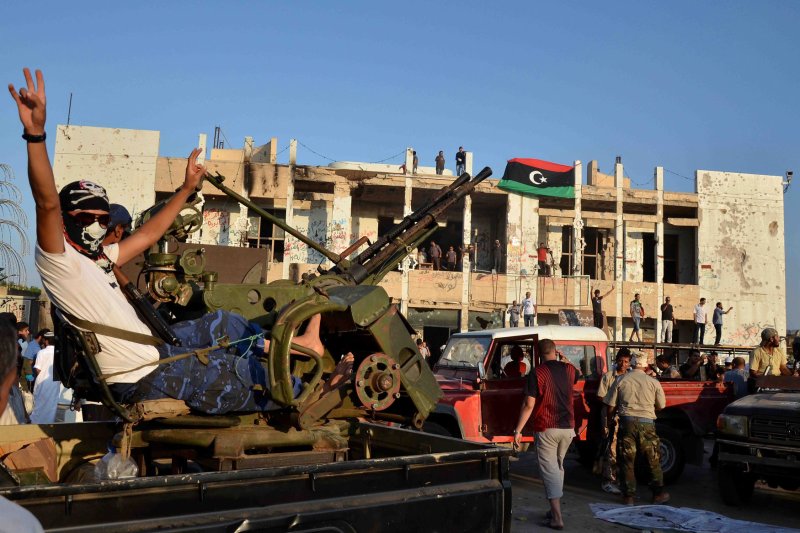1 of 4 | Libyan Rebels celebrate as people tour the inside of Baba al Azizia, Moammar Gaddafi's main military compound on August 26, 2011 in Tripoli, Libya. The main compound has turned into a tourist attraction and a symbol of Gaddafi's ousted regime. Numbers of Libyans are gathering to celebrate his downfall and to tour the compound which up until August 23, 2011 has been hidden from public view until the recent surge into Tripoli by rebel forces. UPI/Tarek Faramawi |
License Photo
BEIRUT, Lebanon, Aug. 30 (UPI) -- The Arab Spring has been "an intelligence disaster" for Western security services because of the fall of Middle Eastern leaders working with the United States and Europe, says a former Central Intelligence Agency chief.
"The help we were getting from the Egyptian intelligence service, less so from the Tunisians but certainly from the Libyans and Lebanese, has dried up -- either because of resentment at our governments stabbing their political leaders in the back, or because those who worked for the services have taken off in fear of being incarcerated or worse," said Michal Scheuer, who headed the CIA unit tasked with hunting down Osama bin Laden.
First and foremost, he says, is the loss of the so-called black rendition system the CIA launched after Sept. 11, 2001.
That involved the agency secretly flying captured terrorist suspects to Egypt, Jordan, Morocco and other Arab states for interrogation by their intelligence services, which frequently involved torture, rather than engaging in the legal niceties required for prosecutions in courts of law.
This murky operation allowed Western agencies, under scrutiny to one degree or another by their countries' legislatures, to claim they were not involved in nefarious or illegal activities while securing the "product" they need to counter terrorism.
Scores, probably hundreds, of suspects were thrust into the hands of Arab intelligence services that human rights organizations accuse of using systematic torture on political prisoners.
Western intelligence agencies, particularly the CIA and Britain's Secret Intelligence Service, better known as MI6, garnered much invaluable information on al-Qaida and its allies and what they were plotting through the cooperation of friendly regimes across the Middle East.
The wave of pro-democracy uprisings across the Arab world, which are still in progress, was "an intelligence disaster for the U.S. and for Britain and other European services," Scheuer said while attending the Edinburgh international book festival.
The author of several books, including "Imperial Hubris: Why the West is Losing the War on Terror" in 2004, Scheuer spent 22 years in the CIA and headed Alec Station, the unit tasked with tracking bin Laden, in 1996-99.
He teaches peace and security affairs at Georgetown University in Washington.
"The amount of work that has devolved on U.S. and British services is enormous, and the result is blindness in our ability to watch what's going on among militants," he said.
"The rendition program must come back -- the people we have in custody now are pretty long in the tooth in terms of the information they can provide in interrogations."
With the fall of Tunisian President Zine El Abedine Ben Ali Jan. 14 and President Hosni Mubarak of Egypt Feb. 11, and even the collapse of Libyan strongman Moammar Gadhafi in recent days, Western agencies found themselves cut off from a flow of vital intelligence on a global foe.
For 20 years, U.S. intelligence has relied on Mubarak's massive intelligence apparatus. The Cairo regime had fought and crushed Islamist militants for two decades but released hundreds of jihadist prisoners when Mubarak fell.
Mubarak's longtime intelligence chief, Gen. Omar Suleimani, was cut out of the loop after the president was forced from office. CIA sources say his successors are not so enthusiastic about helping Washington as he was.
In part that's because U.S. President Barak Obama abandoned Mubarak to the mob, a fear that now pervades other Arab allies.
That's particularly true in Saudi Arabia, which along with Jordan has one of the most effective intelligence services in the Middle East.
Although Gadhafi was branded a sponsor of international terrorism throughout the 1970s and '80s, in recent years his intelligence services had forged close links with their U.S. and European counterparts.
Gadhafi's veteran spymaster, Moussa Koussa, defected to Britain in March. Koussa, who headed the foreign intelligence organization, had played a key role in convincing the West to rehabilitate Gadhafi after he abandoned his secret nuclear program in 2003.
Qatar-based Aljazeera television reported Aug. 23 that another Libyan intelligence chief, Abdullah Senussi, Gadhafi's brother-in-law who was convicted in absentia in Paris of bombing a French airliner over Niger in 1989, had been killed.
The protracted upheaval in Yemen, the stomping ground of one of al-Qaida's most active groups, and the threat to longtime President Ali Abdullah Saleh have seriously disrupted CIA efforts there.





